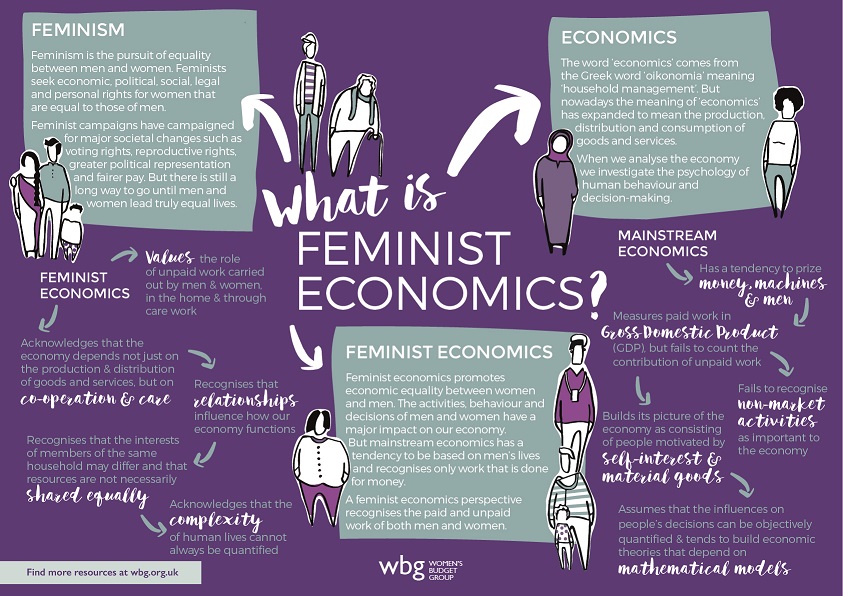Feminist Economics? Emma Williams explains the principles behind it
By Emma Williams, Administrative Officer of UK Women’s Budget Group
Cross-posted from Womens Budget Group

This is a man’s world
This is a man’s world
But it would be nothing
Nothing without a woman or a girl
James Brown wasn’t an economist – and I have it on good authority he wasn’t much of a feminist either – but even he understood that the roles of both men AND women are integral to producing the world we live in, something that mainstream economics seems to have overlooked.
We can see this quite plainly in the way that GDP is measured; taking into account the value produced through wage labour, but not through the unpaid domestic and care work carried out predominantly by women in the home – even though all are essential to a well-functioning economy. Indeed, proponents of feminist economics argue that – in terms of methodology and focus – modern economics is too centred around men, with women’s contribution to the economy routinely ignored.
From a political perspective, feminist economics is an economics that focuses on what is needed to produce a gender equal society. It argues that because modern economics is built around the idea of the “economic man”, it is ideologically weighted towards normalising men’s lives and subsequently ignores the experience of women. For instance, the typical “economic man” works to earn himself an income, engages in traditional market transactions and spends his money selfishly on consumption goods. This individual does not do any housework or have any caring responsibilities, and he certainly doesn’t give birth! As a result, models which are based on “economic man” cannot be expected to understand or even notice gender inequalities, let alone create policies to alleviate them.
Importantly, traditional economic models also provide an incomplete picture of what affects men’s lives, since men’s existence also depends on unpaid work, on production for direct use and on care, and many men are involved in these activities too. A broader conception of what constitutes “the economy” is clearly needed, with the current system – under mainstream economics – dependent for its continued existence on many activities that lie outside of its scope.
In terms of subject matter, feminist economics takes a more holistic approach, factoring in all activities that currently fall outside of the mainstream economic sphere, but that without which the economy would not be able to run. In short, it is concerned with all of the things that human beings need to survive and flourish, but particularly with the provision of care of and unpaid domestic labour, sometimes referred to as “social provisioning”. In making this its focus, it seeks to challenge notions of “work” and “production” that are based solely on manufacturing, and asks us to rethink how we value the different sorts of activity that occur within our economy.
While there has been progress on some aspects of gender equality, women still experience structural inequality throughout their lives. This means that policies impact women and men differently. In many cases, traditional economic policy might actually serve to engender existing inequalities by not taking this into account. For example, independent research carried out before Christmas revealed that women have borne a shocking 86% of the impact of austerity, largely through lost services and changes to the tax and benefit system.
Because women live longer than men, and are more likely to use public services because of childbirth and child-rearing, cuts to these services have a disproportionately negative effect on them. Women are also more likely to depend on the state for a larger part of their income due to economic inequality, workplace discrimination, the gender pay gap and the gendered division of labour – specifically their principal role in reproductive work and caring for others means that they are therefore more likely to rely on benefits or tax credits.
By taking account of the differences in men’s and women’s roles in society, feminist economics is distinctly different to mainstream economics. It asserts that gender relations are a structural characteristic of any economy because changes to the economy can affect gender relations and vice versa, and thus gender needs to be taken into account in any understanding of the economy. In this way, feminist economics is not “economics for women”, but is simply better economics and all economists should be feminist economists!
The Women’s Budget Group have put together a set of easy and accessible resources on feminist economics to help everyone understand the principles behind it. These are available to download below. Please share them with your local feminist groups and start a conversation about what feminist economics is, and how it works!
Download: ‘What is Feminist Economics?’ Resource Pack


Be the first to comment